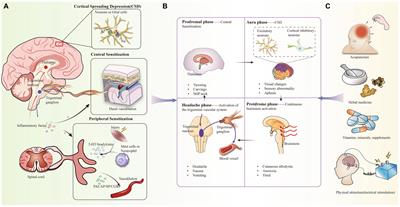New perspectives on migraine treatment: a review of the mechanisms and effects of complementary and alternative therapies

Migraine is a prevalent and disabling neurovascular disorder, with women being more susceptible, characterized by unilateral throbbing headache, often accompanied by nausea and vomiting, and often associated with various comorbidities such as brain and cardiovascular diseases, which can have a serious impact on quality of life. Although nonsteroidal anti-inflammatory drugs (NSAIDs) are the main first-line medications for the treatment of pain, long-term use often leads to side effects and drug addiction, which emphasizes the need to investigate alternative pain management strategies with fewer adverse effects. Complementary and alternative medicine is a viable pain intervention often used in conjunction with traditional medications, including acupuncture, herbs, moxibustion, transcutaneous electrical stimulation, bio-supplements, and acupressure, which offer non-pharmacological alternatives that are now viable pain management options. This review focuses on the mechanistic doctrine of migraine generation and the role and potential mechanisms of Complementary and Alternative Therapies (CAT) in the treatment of migraine, summarizes the research evidences for CAT as an adjunct or alternative to conventional therapies for migraine, and focuses on the potential of novel migraine therapies (calcitonin gene-related peptide (CGRP) antagonists and pituitary adenylyl cyclase-activating peptide (PACAP) antagonists) with the aim of evaluating CAT therapies as adjunctive or alternative therapies to conventional migraine treatment, thereby providing a broader perspective on migraine management and the design of treatment programs for more effective pain management..
Read the full article at the original website
References:
